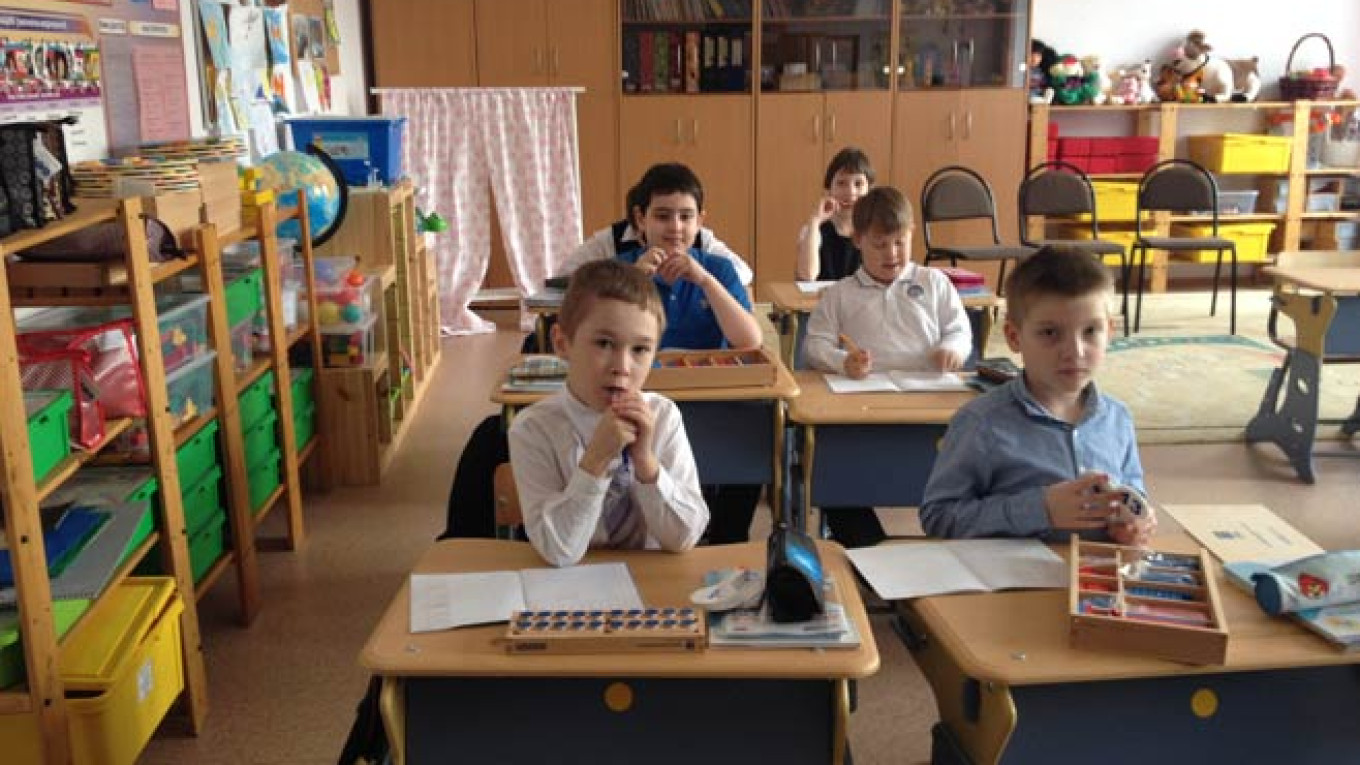Tensions between Russia and the U.S. were eclipsed by colorful classrooms, abacuses and the gap-toothed smiles of first-graders during a visit of U.S. inclusive education specialists to a Moscow school for disabled children on Tuesday morning.
The visit was part of the U.S. State Department's Peer-to-Peer Dialogue Program, an initiative that supports the exchange of best practices between U.S. and Russian professionals in certain fields of interest.
Three staff members of Boston's Institute for Human Centered Design teamed up with Perspektiva, a Moscow-based NGO that strives to improve the well-being of disabled people, to share experiences on providing the best possible care and facilities at Moscow's Special School No. 532.
Despite contentious political issues between the two nations — including the current tensions over Ukraine, Russia's crackdown on NGOs receiving foreign funding and the country's ban on adoptions by U.S. citizens — the specialists said their visit had not been met with any negativity.
"I do not think anybody has a problem with our presence in Russia," Willa Crolius, director of the user-expert laboratory and coordinator of public programs at the Institute for Human Centered Design, said during the visit. "We are just here to exchange [information] about education, about how to make the lives of our children better. We haven't felt the effect of politics at all since we've been here."
Crolius' Russian interlocutors also seemed unmoved by the current tensions between Russia and the U.S.
"We are an open organization," said Svetlana Kremneva, director of Moscow's Special School No. 532, which is solely funded by the Russian government. "We often share information with organizations from different countries. Some people are bothered by international politics, but we don't pay attention to any of this."
A U.S.-funded visit of childcare and education specialists is the kind of initiative that generally infuriates the Kremlin. After passage of the 2012 Dima Yakovlev Act, forbidding the adoption of Russian children by U.S. citizens, Russian politicians made it clear that when it comes to raising Russian children, Russia knows best.
And in 2012, Russia required all nongovernmental organizations to adopt the label "foreign agent" if they receive foreign funding and engage in any kind of "political" activity, severely narrowing the scope of the country's civil society. The director of Perspektiva, Denise Roza, said her organization was spared because Russian authorities did not deem its activities political.
"Nothing we do is political," Roza said. "We still receive foreign funding but did not have to register as a 'foreign agent.' We work with people who are excited about their work and who are willing to listen and share their experiences. They don't try to impose their methods on others."
Perspektiva was funded by the U.S. Agency for International Development in the early 2000s, before Russia ordered the agency to cease its operations in the country in 2012. Russia had accused the agency of using its financial resources to influence Russian domestic politics, as well as the country's institutions.
But the Peer-to-Peer Dialogue Program, which provides up to $100,000 to support joint projects between Russian and U.S. academic institutions and noncommercial organizations, remains afloat. Projects of the program's 2013 edition have included Russian-U.S. exchanges on the decommissioning of nuclear power plants, the prevention of human trafficking and the promotion of sustainable construction.
Grigory Kuranov, a deputy of the Russian State Duma and member of the parliamentary Committee on Family, Women and Children, told The Moscow Times that the initiatives funded by the Peer-to-Peer Dialogue Program create an opportunity for Russia and the U.S. to "get to know each other better."
"There is no doubt that there are tensions between our countries," Kuranov said. "But the countries are worthy of knowing each other, of trying to cooperate. Initiatives that work towards this objective are neither positive nor negative developments. They are necessary."
Contact the author at g.tetraultfarber@imedia.ru
A Message from The Moscow Times:
Dear readers,
We are facing unprecedented challenges. Russia's Prosecutor General's Office has designated The Moscow Times as an "undesirable" organization, criminalizing our work and putting our staff at risk of prosecution. This follows our earlier unjust labeling as a "foreign agent."
These actions are direct attempts to silence independent journalism in Russia. The authorities claim our work "discredits the decisions of the Russian leadership." We see things differently: we strive to provide accurate, unbiased reporting on Russia.
We, the journalists of The Moscow Times, refuse to be silenced. But to continue our work, we need your help.
Your support, no matter how small, makes a world of difference. If you can, please support us monthly starting from just $2. It's quick to set up, and every contribution makes a significant impact.
By supporting The Moscow Times, you're defending open, independent journalism in the face of repression. Thank you for standing with us.
Remind me later.


